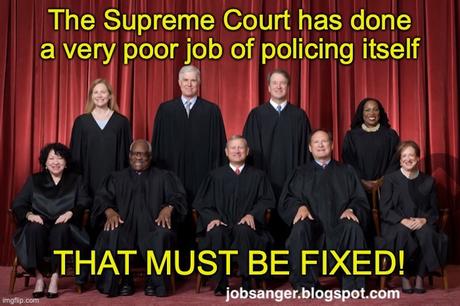
The following post is part of an article at MSNBC.com by Richard W. Painter. Here is how he thinks the Supreme Court can be fixed:
The court’s system of self-regulation has broken beyond repair and must be replaced with a new system of supervision. . . .
Why isn’t this being fixed? Because the justices are allowed to enforce the rules themselves, with nobody looking over them. The Supreme Court is affected by the same corrosive phenomenon we see elsewhere, including in corporations, police departments, academic departments, fraternity houses and many other organizations and businesses: colleagues covering for colleagues. Such private clubs don’t function well as self-regulatory organizations.
Indeed, federal district and appeals judges are already subject to outside oversight, which includes investigations and imposition of discipline by the Judicial Conference of the United States. But the justices of the Supreme Court alone enforce the ethics rules for themselves. And their approach is to allow each justice alone to decide how, or whether, to comply with the law. Colleagues cover for colleagues.
The solution is the same as in other instances of professional misbehavior in close-knit groups of colleagues. We need meaningful supervision, with investigations of alleged wrongdoing and sanctions for those who violate rules. First, the Supreme Court needs a full-time ethics lawyer appointed by the chief justice with the consent of the eight other justices. The ethics lawyer would advise the justices, preferably in writing, about how to comply with the ethics rules in specific instances. That the justices would select their own ethics lawyer isn’t unusual — governmental organizations usually are allowed to pick their own lawyers, and one whom all nine justices agree on is likely to be good.
An ethics lawyer is only the first reform. The second is an inspector general for the Supreme Court. This person would be appointed by the chief justice with the consent of the other justices and confirmed by the Senate to a five-year term and removable only for cause. The Supreme Court inspector general would, like inspectors general in federal agencies, investigate allegations of wrongdoing by justices, clerks or other staff members of the court. If justices don’t take the advice of the ethics lawyer or if they act without consulting the lawyer, that would be referred to the inspector general for investigation. The inspector general would submit reports to Congress, which would typically be made public. And where criminal statutes are implicated, the case could be referred to the Department of Justice.
The justices interpret the Constitution and laws of the U.S. in decisions binding on lower courts and that affect all of our lives. They have lifetime tenure, but we have seen that tenure combined with colleagues covering for colleagues doesn’t work. Nobody is above the law. The justices also must obey the law. The court can’t be allowed to become an Animal House of ethics, and if the justices think there’s nobody to supervise them, Congress will need to show them that they are badly mistaken.

